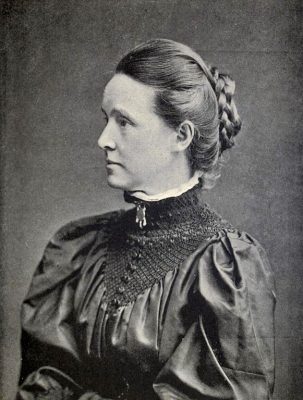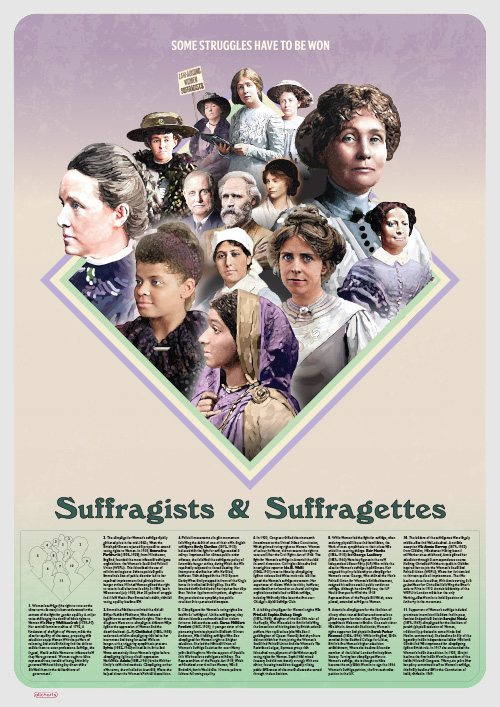Wallcharts
Suffragist or Suffragette?
We often talk about the suffragettes. But how often do we talk about the suffragists? And what was their role in securing women’s right to vote? Was it all the work of the suffragettes? These are some of the questions we ended up asking ourselves when we began researching this wallchart.
The rapid industrialisation of Britain in the 19th century meant that more women were working in factories, starting their own businesses and paying taxes, yet they couldn’t participate in elections and vote for people able to serve their interests. The suffragists emerged at this time with the mission of reforming the law on voting. The term ‘suffragist’ comes from the noun suffrage, meaning the right to vote. A suffragist is someone who favours extending voting rights, particularly for women.
By the end of the 19th Century the leading organisation was the National Union of Women’s Suffrage Societies (NUWSS), and was led by Millicent Fawcett. The group aimed to secure women’s right to vote by lawful means. By 1914 the NUWSS had grown to over 100,000 members and hundreds of branches across the country. There were similar groups for men who supported women’s suffrage, including the Men’s League for Women’s Suffrage, founded in 1907, and in 1910 the Men’s Political Union for Women’s Enfranchisement. Men who joined these organisations risked being ostracised or losing their jobs for supporting the women’s cause.

The suffragettes were militant activists who emerged at the beginning of the twentieth century frustrated by the failure of suffragists to secure meaningful change. The term ‘suffragette’ was coined by journalist Charles E. Hands in 1906 to belittle those fighting for women’s right to vote. The suffix “-ette” is used to refer to a smaller (hence inferior) version of something, like a kitchenette or novelette. The activists embraced the insult, however, and used it in their campaign literature and posters. Their increasingly militant actions together with increasing support amongst some members of the public gained momentum and eventually led to legislative change.
The Representation of the People Act of 1918 granted the right to vote in parliamentary elections to women over the age of 30 who met a property qualification (the need to own a property of a certain value). The same Act gave the vote to all men over the age of 21 regardless of their property status. It was not until The Representation of the People (Equal Franchise) Act 1928 that women were given the same voting rights as men, regardless of their property status.
Today the suffragists and suffragettes continue to inspire those that seek to improve and extend civil rights and equality legislation. It is still less than a century since women gained equal voting rights in Britain and it was not until the Equality Pay Act 1970 that employers were prohibited from discriminating between men and women. 2017 regulations linked to the 2010 Equality act require businesses and organisations of 250+ employees to collect gender pay gap data. The published results show that men are still paid more than women in most sectors.
So, who made the real difference: suffragists or suffragettes? Through their more violent and disruptive protests, the suffragettes had greater success in commanding the attention of the press and general public. However, their methods (including burning down the house of David Lloyd George, a politician sympathetic to their cause) could sometimes be counterproductive, alienating public and parliamentarians alike. By contrast, the suffragists understood these risks, and on both moral and tactical grounds eschewed such tactics. Overall, it is likely that both groups made a major contribution to the cause, the one through steady campaigning and persuasion and the other through dramatic interventions that brought urgency to the debate. To the modern imagination, the actions and perceived martyrdom of the suffragettes has perhaps had a more lasting impact. But these do not overshadow the achievements of their more moderate counterparts.

